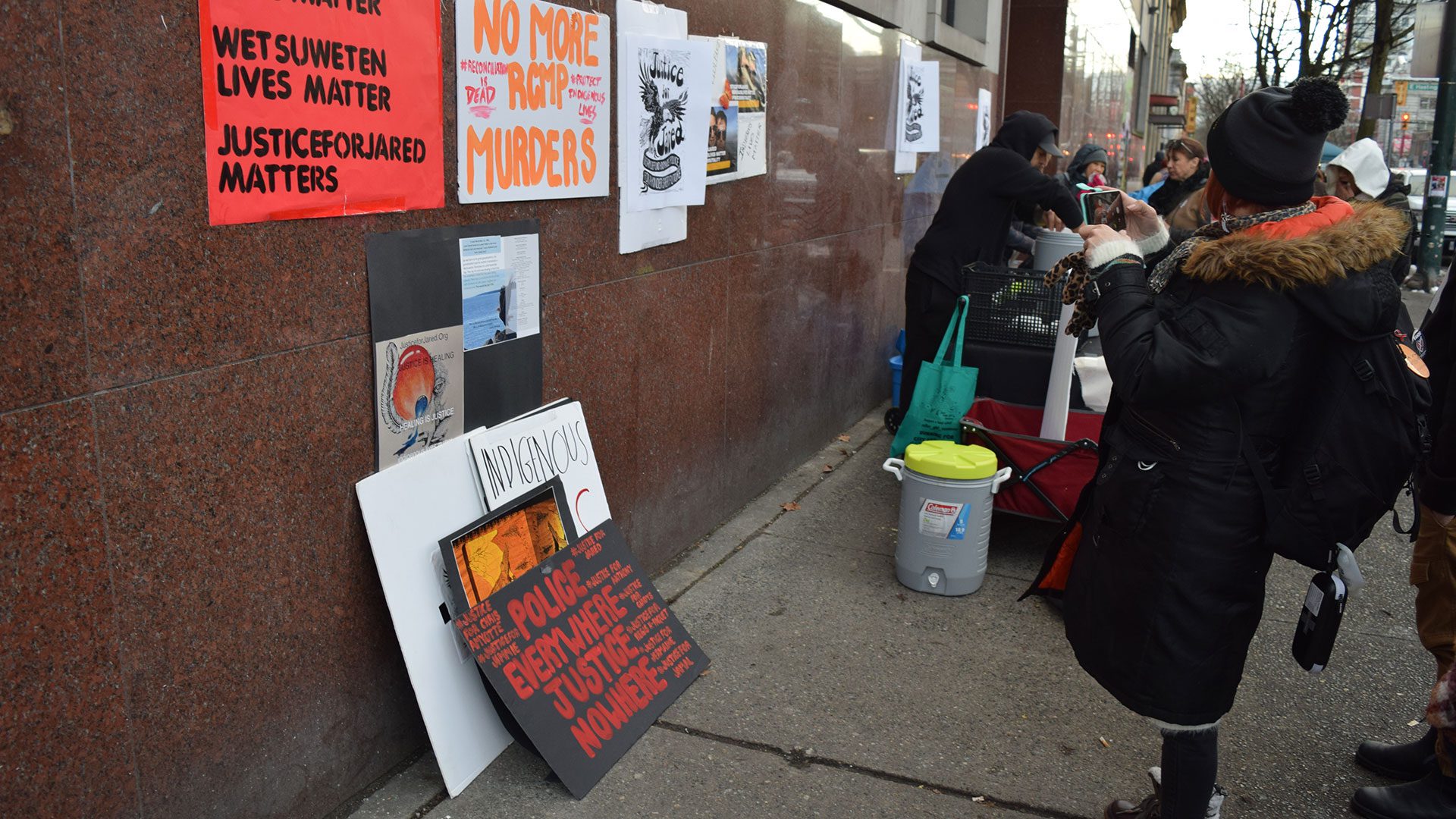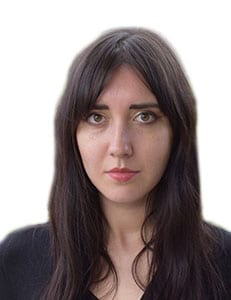
Laura Holland, right, speaks to media in Vancouver on Thursday. Photo: Cara McKenna/IndigiNews
Three Mounties involved in the death of Jared Lowndes could now face charges nearly a year and a half after the Wet’suwet’en man was shot in a parking lot in Campbell River, B.C.
The Independent Investigations Office of BC (IIO) announced Thursday it has determined “reasonable grounds” that officers may have committed offences related to the use of force, and will file a report to prosecutors recommending charges.
After the police watchdog agency’s update, Lowndes’s mother Laura Holland spoke to media and supporters in Vancouver, where she said the IIO’s decision confirms what her family has always suspected about the RCMP officers’ actions that day.
“We knew that they had done wrong, we knew that everything that they did that day was wrong,” she said. “Now we have to wait for the Crown to make their decision.”
‘The RCMP is going to kill me’
Lowndes, of the Laksilyu Clan, was killed on the morning of July 8, 2021, during an interaction with RCMP.
Investigators confirmed that police attempted to check Lowndes’s car just before 5:30 a.m., and located him later at a Tim Hortons’ drive-thru. During a confrontation, a police dog was used and Lowndes was shot, RCMP said.
Holland said the trauma of her son’s death was compounded because his body was left in the sun for 12 hours before the IIO could make it there.
Six months before his death, Lowndes had written a chilling letter to a lawyer where he detailed alleged harassment by police, including being deprived of food and blankets while in custody.
“My name is Jared Lowndes, I’m First Nations and the RCMP is going to kill me,” he wrote in January 2021, according to the letter shared by his family.
“I was recently in the Supreme Court of Vancouver. I was falsely charged with various offences, which I vehemently deny. During the process, I was assaulted by several VPD (Vancouver Police Department) officers, I was forced to be naked outside. They threatened myself and my family.”
There was an outstanding warrant for Lowndes, RCMP have said, the day he was stopped and shot. This past July, on the one-year anniversary of his death, his mother ceremonially opened evidence bags of the clothing he was wearing that day and witnesses counted what appeared to be multiple bullet holes.
Lowndes, who was 38, was a father of two children and had ties to the Xwemalhkwu First Nation. His family and friends continue to remember him for his loving spirit and the way he protected the people he cared for.
“My son was a loving man,” his mother said. “He did not deserve to die the way he did.
“There was so much indignity in his death and what came afterwards…This should have never happened. This is a call for justice.”

At the protest, Holland acknowledged families whose relatives have been killed by police — specifically Julian Jones, a Tla-o-qui-aht man shot by RCMP in February 2021. Though Jones was killed by police, the IIO announced Nov. 16 it would not be recommending charges.
Grand Chief Stewart Phillip, of the Union of B.C. Indian Chiefs (UBCIC), said the IIO has generally failed to live up to its mandate to hold police agencies accountable. He said the UBCIC had “served notice” to the IIO, telling them there needs to be serious reform.
“In today’s world, too many Indigenous Peoples are shot and killed by the RCMP and other police forces across this country,” Phillip said. “We have a list and there are about 100 names on that list, just in regards to police shootings and deaths of Indigenous people.
“There are a lot of families that have been traumatized for years now who haven’t received the full measure of justice.”
Meghan McDermott, a policy director for the BC Civil Liberties Association (BCCLA), agreed finding even a small measure of justice is “rare” for Indigenous families who have been impacted by police violence.
“Even now, Jared’s family is going to have to wait for months – if not years – for the Crown to make a decision,” she said.
“We’re going to be there putting pressure on the Crown to make a decision. All they have to do is review a file. That’s all they have to do. People shouldn’t have to wait so long.”
Community power
Tonye Aganaba, a criminalization and policing campaigner with Pivot Legal Society, said the IIO’s finding is the result of campaigns such as Justice for Jared.
“Really, I think it comes down to what we’ve always known to be true and what’s really at the root of all of this organizing, which is community power,” they said. “We did this together.”
Holland said the finding doesn’t represent the end of their advocacy, but a new beginning. There have already been many specific recommendations made to police agencies, including the IIO, by advocates.
“This is the beginning of a fight where we are going to ask for changes to policies, we’re going to ask for changes to laws,” she said, “because there have been far too many Indigenous people being shot and killed, maimed, murdered by the RCMP and different police forces across Canada.










